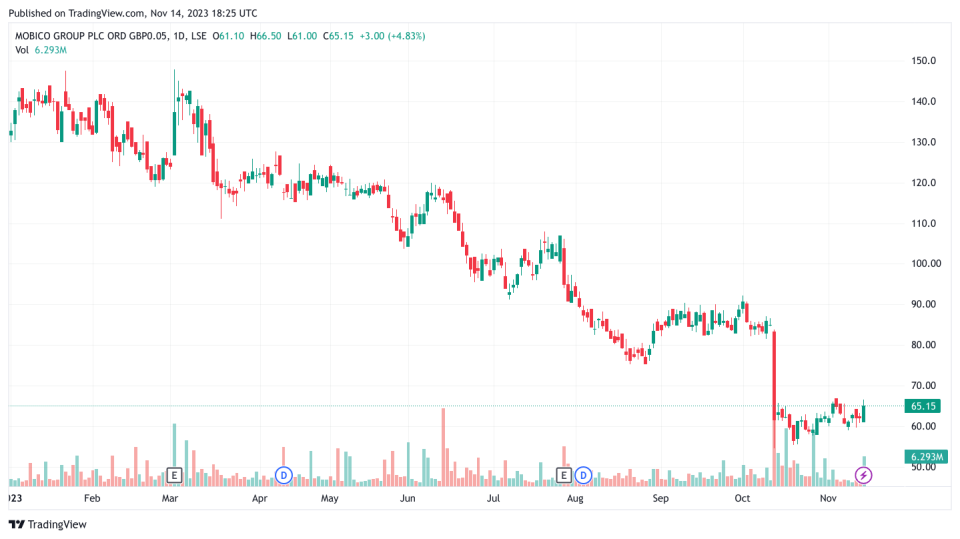Can National Express owner Mobico turn its fortunes around?

Transport operator Mobico’s share price has reached all-time lows this year.
Previously known as National Express, the well-known coach brand changed its name to Mobico in June in a bid to better reflect the company’s international scope.
But the rebranding, and its push into global markets, isn’t going entirely to plan. Shares are down around 50 per cent over the year to date, with a profit warning in October sending Mobico tumbling to the bottom of the FTSE 250.
The company was hit hard during the pandemic, but government support kept it afloat. And while it rebounded last year, Mobico has been pummelled by inflation and the removal of that Covid-era funding.
There are no scheduled dividends for investors in the near future, it is set to miss forecasts and it has a hefty debt pile. It doesn’t make for pretty viewing.
Can the company turn things around?
North America business
Central to explaining Mobico’s performance this year is its North American school bus segment.
October’s profit warning came alongside an announcement the company was exploring a sale of the division, which has been hamstrung by high costs and bus driver shortages.
“In the US, they have a problem,” Alexander Paterson, research analyst in transport and energy services at Peel Hunt, told City A.M.
A shortage in bus drivers has bumped up employment and training costs, Paterson said, while revenues have come in slightly less than expected. To prep for the start of the busier autumn term, “it’s cost more to train them [the drivers] faster,” he added.
Selling off the bus business would solve the problem of cost but that won’t be until 2024 at the very earliest.
And Paterson warned Mobico may not be able to get a good price, “because of the driver shortages, because it hasn’t done particularly well and because borrowing costs [and] bond yields have increased.”
“Your margin expectations, your cash generation expectations in the early years are going to be lower than they would have been… so you may not get, you’re unlikely to get a great price,” he explained.

Trouble in the West Midlands
In the UK, where Mobico has retained the National Express brand, similar issues are arising in its West Midlands bus segment.
Industrial action forced the company into offering a significant 16.2 per cent pay rise for its workers back in March, while fuel and servicing costs have both jumped. At the same time, commercial passenger volumes have come in less than expected, lowering revenues.
Paterson said National Express would need to talk to Transport for West Midlands, the public body responsible for coordinating transport services in the regions, to give them some extra cash or else “reduce the mileage.”
Easier said than done given Birmingham City council went bust in September, likely making local authorities a lot more frugal than usual.
Industrial action on Britain’s rail network has provided some respite, with bookings soaring during walk-outs as passengers look for other means of travel.
Passenger volumes saw “healthy” growth in 2023, Russ Mould, investment director at AJ Bell said, but “the good news stopped there” ahead of October’s nightmare update.
A ray of light
There is light at the end of the tunnel for Mobico despite this year’s problems, however.
Its European division is delivering a consistently strong performance.
Momentum is good in Mobico’s Spanish long haul business Alsa, which has traded well this year and saw passenger volumes up 29 per cent in the last trading update.
In a note last week, analysts at HSBC said “significant temporary benefits to Alsa from a multi-voucher scheme,” which could lift future profits above estimates. HSBC gave the operator a buy rating but warned there was still “much to prove.”
“While disappointing, forecasts for this year should now set the floor from which recovery is possible… profits should rebuild and, from a top-down perspective, we are comfortable with where we end up on the forecasts,” the analysts said.
“While disappointing, forecasts for this year should now set the floor from which recovery is possible.”
HSBC Analysts
Experts told City A.M. in October that if the operator could manage its costs and continue growth in Europe, it should be able to get itself back on track having been well-established in the sector over the past few decades.
Costs are ultimately the key to the revival of Mobico, as well as whittling down its debt pile, which sat at £1.2bn as of June, once leases and pensions were taken into account.
Mould said it was “no coincidence that Mobico is looking to preserve cash with the dividend cut and sell its US assets so it can pay down its own debt.”
He added: “The unexpected year-on-year drop in profits in 2023 and the share price plunge are clearly focusing the boardroom’s attention on the balance sheet.”
The operator has announced a number of top level changes this year, with Alex Jensen brought in in September to head up the UK business and Tim Wertner appointed as head of the North American bus division.
The new executives certainly face a big challenge.